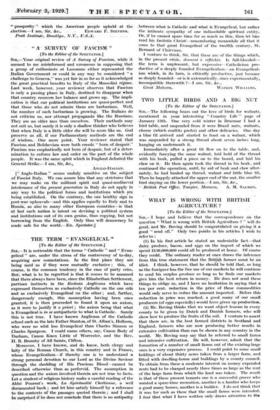THE TERM " EVANGELICAL " [To the Editor of the
SeEcrkrort.] Sri,—It is noticeable that the terms " Catholic " and " Evan- gelical " are, under the stress of the controversy of to-day, acquiring new connotations. In the first place they are being Used* as if they were mutually exclusive ; this, of course, is the common tendency in the case of paity cries. But what is to be regretted is that it comes to be assumed that there always have been, since the Elizabethan Settlement, partisan instincts in the Ecde-sia Anglicana which have expressed themselves as exclusively Catholic on the one side and as exelusively Evangelical on the other'; and, further, dangerously enough, this assumption having been once granted, it is • then proceeded -to found it upon an axiom, as it were to justify it a priori ; the axiom being that what is Evangelical is in se antipathetic to what is Catholic. Surely this is not true. I have • known Anglicans of the Catholic school such as the late Father Stanton, of St. Alban's, Holborn, who were no whit less Evangelical than Charles Simeon or Charles Spurgeon. I could name others, say, Canon Body of Durham, Canon Knox Little of Worcester, and the Rev. H. B. Bromby of All Saints, Clifton.
Moreover, I have known, and do know, both clergy and laity of the Raman Church, in this country and in France, whose Evangelicalism—if thereby one is to understand a strong personal devotion to our Lord as. the Divine Saviour through the shedding of -His Precious Blood—cannot be described otherwise than as perfervid. The assumption in question and the axiom involved therein are not true to facts. Let a student of religious history make a careful reading of the Abbe Pourrat's work, La ,Spiritualite Clirdienne, a well documented book ; and let him- satisfy himself by a reference to the contexts of the passages quoted therein ; and I shall be surprised if he does not conclude that there is no antipathy - between-what is Catholic and what is Evangelical, but rather the intimate sympathy of one indissoluble spiritual entity. Or, if he cannot spare time for so much as this, then let hint read his Imitatio Christi—remembering meanwhile all that it owes to that -great Evangelieal of the twelfth century, St. Bernard of Clairvaux.
I venture to think, Sir, that these are of the things which, in the present crisis, donnent a reffechir. Is full-blooded— the term is unpleasant, but expressive—Catholicism pro- ductive of a deeply founded Evangelicalism—an Evangelical- ism which, in its turn, is ethically productive, just because so deeply founded—or is it axiomatically, since experimentally, incompatible therewith am; Sir, &c.,








































 Previous page
Previous page